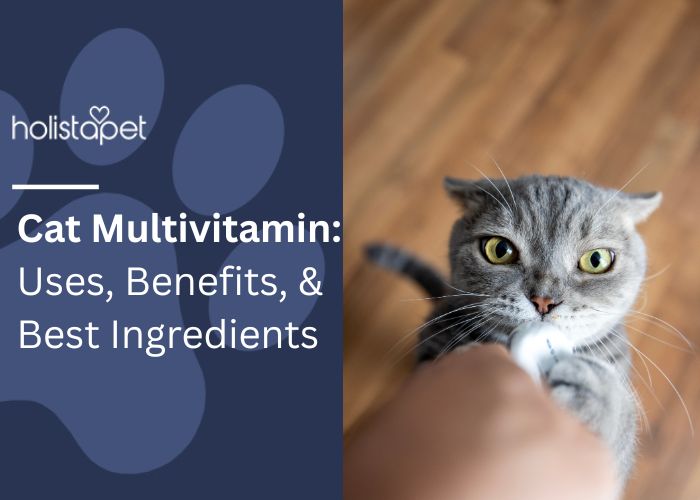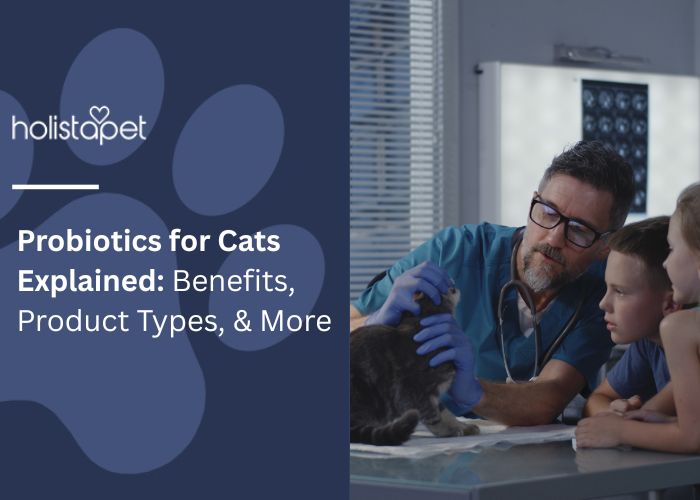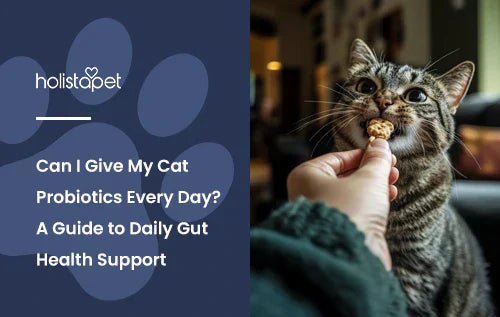Fish flakes alone aren't enough to power your kitty's 3 a.m. zoomies. Along with their regular meals and favorite snacks, they need a daily cat multivitamin to fill any nutritional gaps.
These tiny wonders support everything from mood to skin to vitality. One scoop or chew, and your feline friend might just start strutting like royalty.
What Is a Cat Multivitamin?

A cat multivitamin is a blend of vitamins, minerals, and amino acids formulated specifically for feline pets. It promotes cats' health by filling nutritional gaps left by their regular meals. Yes, even premium cat foods can fall short on essential nutrients.
These wellness options support heart health, energy levels, joint strength, and brain function, to name a few. They're made to work with your fur baby's diet, not replace it.
Why Do Cats Need Multivitamins?
Cats need multivitamins to support their overall health, especially when their diet isn't doing enough. The truth is, even well-fed kitties can miss out on key nutrients. These supplements are particularly useful for older felines, picky eaters, and pets on homemade or raw diets. The right blend of ingredients keeps them feeling sharp from the inside out.
Nutritional Gaps in Commercial Cat Food
Most commercial cat foods meet the basics but miss out on certain essentials. Even those labeled "complete" can lose nutrients during processing. Over time, those small gaps add up. That's why adding a well-rounded supplement to your kitty's routine is crucial. Doing so helps balance out their nutrition and long-term wellness.
Age-Related Nutritional Needs (Kittens vs. Seniors)
Kittens need support for their rapid growth. Their tiny bodies burn through nutrients fast, and a multivitamin helps keep up with the demand. Older felines face a different challenge. As they enter their senior years, their bodies absorb less from their food. They need something like a joint, muscle, and immune health supplement to stay spry.
Support for Skin, Coat, and Immune System
Dry skin, shedding, and a dull coat can point to missing nutrients in your cat's diet. Vitamins like E and C, along with fatty acids like linoleic acid, promote skin and coat health from within. A good multivitamin can also promote a healthy immune system. Ingredients like antioxidants and B vitamins aid cellular health and immune response.
Multivitamin for Cats: What's Usually Inside?
A multivitamin for cats typically includes a mix of essential vitamins, minerals, amino acids, and natural ingredients that aid overall health. Other common ingredients include salmon oil and probiotics for added benefits. These blends are specifically formulated for feline needs. They're not simply a downsized version of human supplements.
Common Vitamins & Minerals (e.g., A, B12, D, E, Taurine)
Vitamin A helps with eye health and immune function. B vitamins support energy, mood, and brain health. Vitamin D helps regulate calcium and aids muscle function and bone strength. Vitamin E acts as an antioxidant and promotes skin and coat health. Taurine is an essential amino acid for heart health, vision, and cellular function.
Added Functional Ingredients (e.g., Omegas, Probiotics, Antioxidants)
Omegas like linoleic acid and salmon oil support coat shine and skin comfort. They're also great for joint health and immunity, especially in older pets. Probiotics help balance digestion and may reduce upset stomach or irregular stool. Antioxidants like vitamin C support immune health and protect cells. Some formulas also include brewer's dried yeast for extra B vitamins.
Signs Your Cat May Benefit From a Multivitamin

Not all signs of a nutrient gap are easy to spot, but a few stand out. If your cat shows any of these signs, it might be time for a daily multivitamin:
-
Lethargy or Low Energy. Your cat sleeps more than usual or skips playtime.
-
Dull Coat or Excessive Shedding. A lack of fatty acids or vitamin E may cause coat issues or more shedding than normal.
-
Digestive Discomfort or Irregular Stool. Upset stomach or inconsistent litter box visits can mean a lack of digestive support.
-
Low Appetite or Mood Changes. Nutrient gaps can affect appetite and overall behavior, especially in senior cats.
Types of Cat Multivitamins: Choosing the Right Format
Multivitamins come in different convenient forms. The right choice depends on your kitty's preferences and how easy it is for you to give it. Choose from:
- Soft Chews
- Liquid Droppers
- Powders and Toppers
- Capsules or Tablets
Soft Chews
Soft chews are a popular choice because most cats think they're treats. They come in flavors like salmon or chicken, which makes daily dosing easier. The texture is gentle on teeth, especially for older cats.
These chews often include B vitamins, vitamin E, and taurine. Some formulas have extras like glucosamine for joint health. If your cat loves snacks, this format usually gets the job done.
Liquid Droppers
Liquid droppers are great for felines who turn up their noses at chews and pills. You can squirt the liquid right into their meal or mix it with a snack. It blends easily and has little to no smell.
Many liquid formulas include vitamin D, salmon oil, and amino acids for brain and heart health. Some also aid hydration and digestion. This format works well for picky cats and those with sensitive stomachs.
Powders and Toppers
Powders and toppers mix right into your cat's regular meals without changing the texture too much. They're a good option for pets who dislike chews and liquids. Most have a mild flavor that cats won't notice.
These blends often include probiotics, antioxidants, and fatty acids. They can promote digestion, immune health, and coat quality. If your cat's a grazer or picky eater, this format can sneak in wellness without a fuss.
Capsules or Tablets
Capsules and tablets pack a lot of nutrients into a small space. They're best for cats who tolerate pills and for pet parents comfortable with pill pockets. Some options you can open and sprinkle into food.
These often include a full spectrum of vitamins like B vitamins, vitamin E, and taurine. They're commonly used for targeted help in older cats and pets with specific health needs. They're great for precision, though not ideal for picky eaters.
Best Ingredients To Look for in a Quality Cat Multivitamin

The best cat vitamins use wholesome ingredients and avoid artificial fillers. Look for products crafted with real feline needs in mind, not just what's trendy. Here's a quick guide:
- Natural, Non-GMO Sourcing. Helps reduce the risk of unwanted side effects and promotes better absorption.
- No Artificial Flavors or Fillers. Clean formulas focus on health benefits, not unnecessary extras.
- Veterinarian-Approved Formulas. Trusted blends that follow expert recommendations for cats' daily nutrition.
How to Safely Add a Multivitamin to Your Cat's Routine
Start slow and keep it simple. Choose a format your cat likes, and always follow the product's feeding directions based on weight or age. Monitor for changes in mood, energy, and digestion. When in doubt, talk to your veterinarian before starting something new.
Dosing by Weight or Age
Cats of different sizes and ages need different amounts. Kittens need smaller doses to match their growth, while older cats may need more help for joint health and immune function.
Most products include clear feeding directions based on weight. Stick to the label and avoid guessing. Giving the right amount helps your cat get the full benefits without going overboard. For anything unusual, your veterinarian can help you adjust safely.
Mixing With Meals or Treats
The easiest way to give your cat vitamins is by mixing them into their regular food. Powders and liquids blend in well with both wet and dry meals. You can also offer soft chews as a treat.
For picky felines, you can try crushing tablets or using a small topper to mask the flavor. Just make sure they eat the full serving. This method keeps things simple and makes the routine easier to stick with.
Watch-Outs for Over-Supplementation
More isn't better when it comes to vitamins. Too much of certain nutrients, like vitamin D or potassium chloride, can cause discomfort or throw off your cat's dietary balance. Stick to the recommended dose on the label.
Watch for signs like upset stomach, changes in mood, and stool irregularities. If anything feels off, stop the supplement and talk to your vet.
Are Multivitamins Safe for All Cats?

Most multivitamins are well-tolerated by healthy cats when given as directed. But not every formula fits every feline. Those with kidney issues, liver conditions, and other health concerns may need a different blend (or none at all). Pregnant or nursing cats also need extra care.
Always talk to your veterinarian before adding new supplements. That way, you'll know if the formula aids your cat's health or needs adjusting for their condition.
How To Choose the Best Multivitamin for Cats
Picking the right multivitamin starts with knowing what your cat needs. Read labels and don't settle for vague ingredients. Here's what you can do:
- Look for Complete & Balanced Formulas. Check that it includes essential vitamins, minerals, and amino acids.
- Check for Third-Party Lab Testing. COAs (Certificates of Analysis) confirm safety, quality, and that what's listed is what's inside.
- Pick the Right Format for Your Cat's Preferences. Chews, powders, or liquids—go with the one your kitty will actually eat.
- Consider Your Cat's Age and Health Needs. Senior cats, kittens, and those with sensitive stomachs need targeted help.
- Read Reviews and Brand Transparency. Trust companies that explain sourcing, testing, and production.
- Ask Your Veterinarian for Guidance. Always confirm with your vet before starting any new supplement.
Holistic Benefits of Natural Cat Supplements
Natural cat supplements promote your kitty's overall wellness using ingredients that work with the body, not against it. That means fewer fillers and more functional support. From brain health to joint comfort, natural blends may include things like fish oil, probiotics, and herbal extracts. These ingredients help with mood, energy, and immune health, supporting your cat's wellness routine without overcomplicating it.
Hemp Seed, CBD, and Herbal Ingredients
Hemp seed, CBD (cannabidiol), and gentle herbs can support your cat's mood, comfort, and relaxation. Hemp seed is rich in fatty acids that help with skin, coat, and heart health. Herbal additions may offer calming effects for anxious behaviors or sleep.
HolistaPet's CBD Collection for Cats includes calming oils, treats, chews, and capsules. Each product features broad-spectrum CBD, is third-party lab-tested, and approved by veterinarians. It's designed just for felines, bringing well-tolerated, focused support.
Digestive & Immune Support From Botanicals
Botanical ingredients like ginger, turmeric, and licorice root can support digestive comfort and immune health. These natural additions work alongside core vitamins to help soothe upset stomach and support regular digestion.
Some multivitamins include probiotics, antioxidants, and mild herbs to promote balance in the gut. A stable gut often means a stronger immune response and fewer mood swings. It's one more way to back up your cat's daily routine without adding unnecessary extras.
How Long Until You See Results With a Cat Multivitamin?
Most cats show subtle changes within a few weeks. You might notice more energy, better coat quality, and improved digestion around the two- to four-week mark. It all depends on your pet's age and dietary situation.
Consistency is important to see results. Give the multivitamin daily and follow the feeding directions. If your pet's routine already includes a raw diet or homemade meals, results may appear faster. Always watch for small changes because they do add up.
Tips To Encourage Your Cat To Take Their Multivitamin

Getting your cat on board takes a little creativity. Try one of these tricks to make things smoother:
- Use Strong-Smelling Treats. Hide the vitamin inside something fishy or flavorful that your cat can't resist.
- Create a Daily Routine. Serve it at the same time each day, so your feline friend expects it.
- Try Different Formats. Switch between soft chews, powders, or liquids to find what your cat likes.
- Warm Up the Food. A slight heat-up can boost aroma and help hide the supplement.
- Crush and Mix. Break tablets and mix with wet food to mask the texture.
FAQ – People Also Ask About Cat Multivitamins
Cat vitamins raise a lot of good questions, especially from animal lovers who want to get things right. Finding clear answers shouldn't feel like a scavenger hunt. This section clears up common concerns about ingredients, safety, and results. If you've been wondering what's worth adding to your cat's diet, this is the place to start.
Are cat multivitamins necessary if I feed high-quality food?
Even the best cat foods can fall short on certain nutrients. Processing, storage, and ingredient limits can lead to small but important gaps. A multivitamin helps fill those in without changing your companion's main diet. Think of it as a backup system.
What's the best multivitamin for cats with sensitive stomachs?
For sensitive stomachs, look for simple, clean formulas with wholesome ingredients. Avoid artificial flavors, fillers, and common allergens. Powders or liquids are often easier to digest than tablets or chews.
Choose a cat multivitamin that includes probiotics, vitamin B12, and amino acids. These can support digestion and energy without upsetting the gut. Always introduce new products slowly and watch for changes in stool, mood, or appetite.
Can I give my cat human vitamins?
No, human vitamins aren't safe for cats. They're made for different bodies with different needs. Some ingredients, like excessive vitamin D or iron, can cause discomfort or worse in pets.
Cats need nutrients in specific amounts and forms. A cat-specific multivitamin is specifically formulated to match those needs. Always stick to products designed for feline health and approved by your veterinarian.
Are senior cats more likely to need supplements?
Yes, senior cats often need extra support as their bodies slow down. They may struggle with reduced mobility, lower energy, and digestive changes. Their ability to absorb nutrients from food can also decrease over time.
A multivitamin can help support joint health, brain function, and immune defense. Look for blends that include fatty acids, antioxidants, and B vitamins. These ingredients help older cats stay active, alert, and more comfortable in their senior years.
How do I know if a multivitamin is working?
Start by watching for small changes. Is your cat more playful? Is their coat shinier or shedding less? Improved mood, digestion, and energy are all signs it's working.
These shifts may show up within a few weeks of daily use. Keep an eye on your cat's appetite, stool, and general behavior. If things seem smoother overall, the multivitamin is likely doing its job.
Final Thoughts on Choosing a Cat Multivitamin
A well-made cat multivitamin can support everything from immune health to mood, especially when regular food isn't cutting it. Look for clean, vet-approved formulas with natural ingredients and clear dosing directions.
HolistaPet offers feline-focused supplements, with each batch lab-tested for quality and made with your kitty's comfort in mind. It's support your best friend actually needs and might even enjoy.
Click here to explore more about your cat’s nutrition!







![Probiotics For Dogs [Soft Chews] - HolistaPet](http://www.holistapet.com/cdn/shop/files/Probiotic-Infographic-1_472d7a29-e30c-435a-9638-1365d8c3a9f9.jpg?v=1725384841&width=104)
















 CBD Oil for Cats - Fast Acting
CBD Oil for Cats - Fast Acting
 CBD Cat Treats - Easy Dose
CBD Cat Treats - Easy Dose
 CBD Calming Chews for Cats - Highly Rated
CBD Calming Chews for Cats - Highly Rated
 CBG Oil for Dogs and Cats - Loved by Thousands
CBG Oil for Dogs and Cats - Loved by Thousands





Leave a comment
All comments are moderated before being published.
This site is protected by hCaptcha and the hCaptcha Privacy Policy and Terms of Service apply.